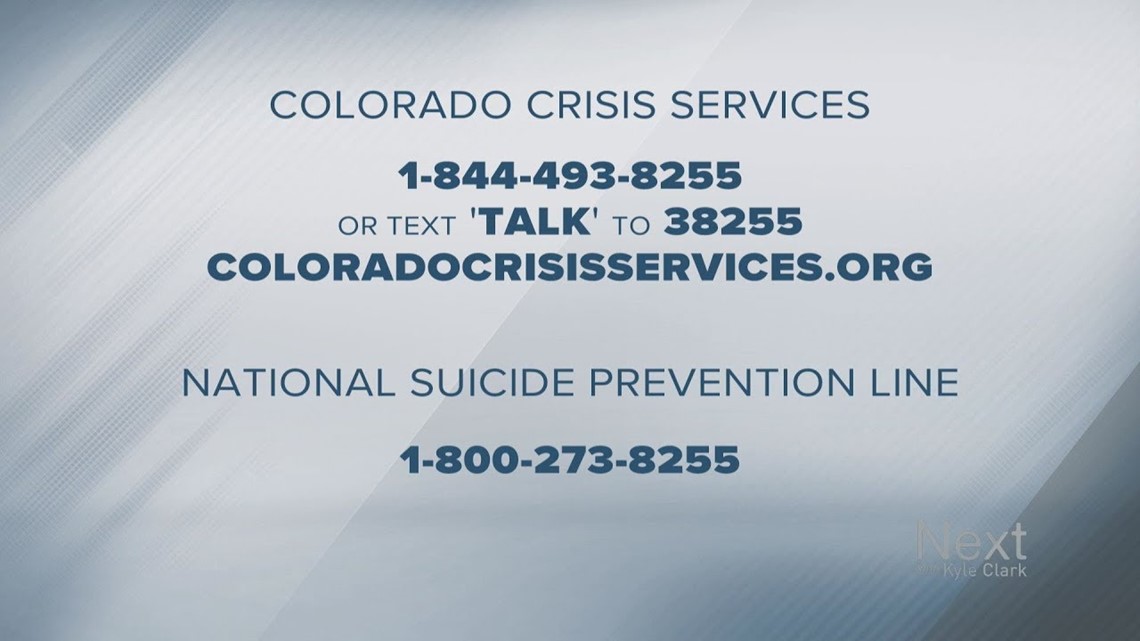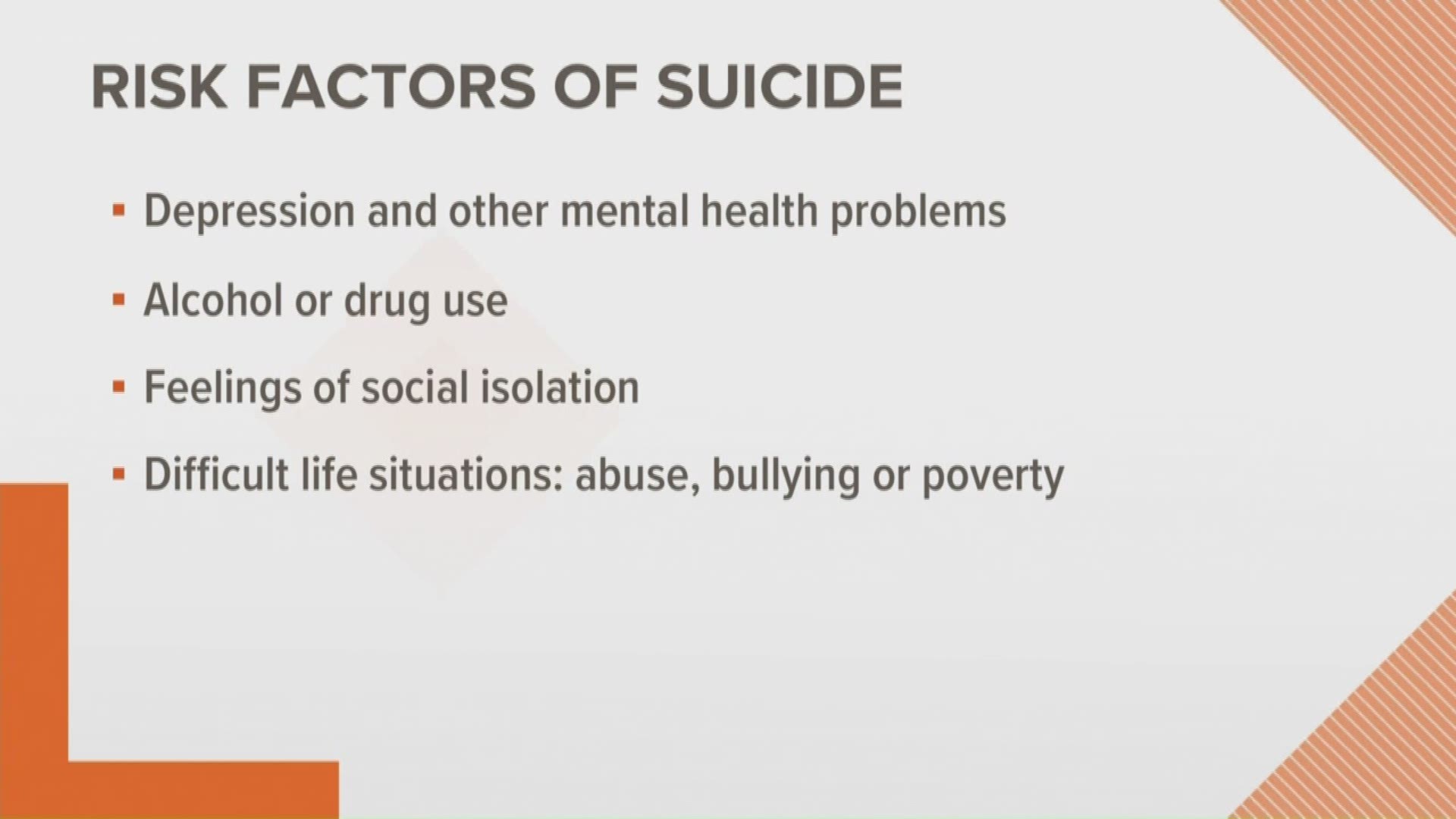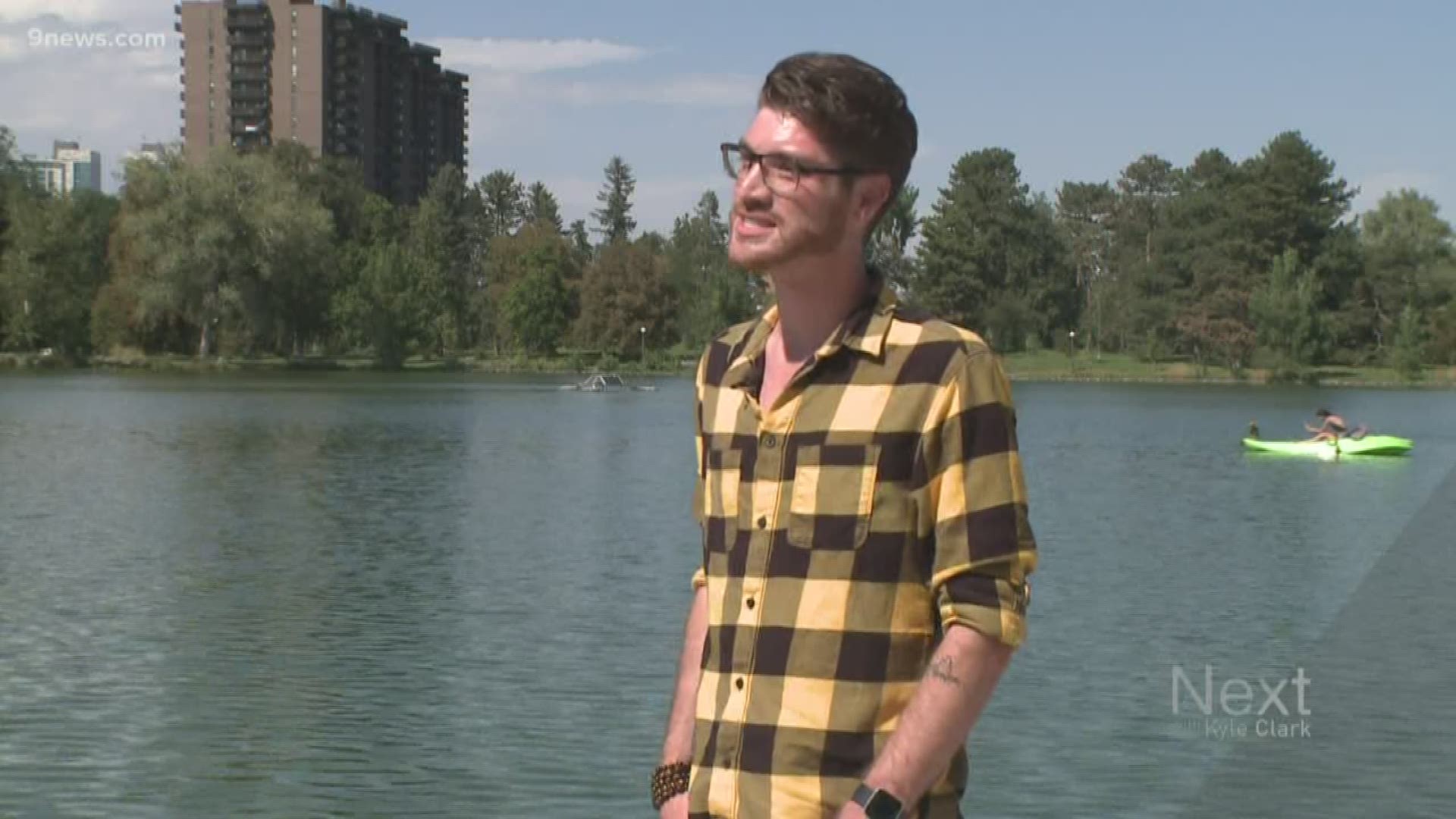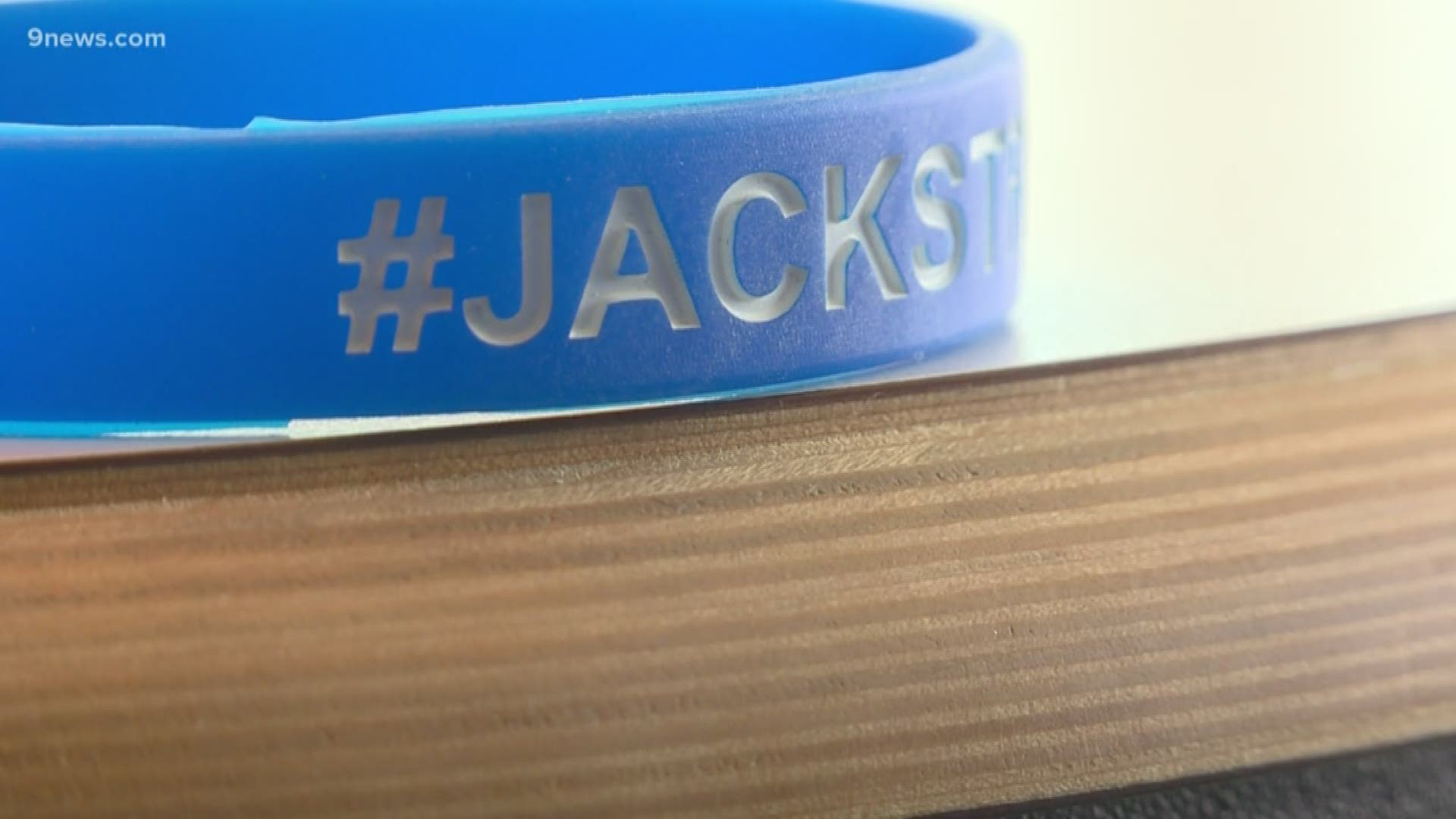DENVER — One person in the world dies from suicide every 40 seconds, the World Health Organization said this week.
In the United States, the Centers for Disease Control said suicides have increased by 30% since 1999. The most recent data shared by the American Foundation for Suicide Prevention showed that more than 47,000 people died by suicide in 2017, and the Colorado Health Institute said 1,175 of them were in Colorado.
Based on that statistic, Colorado had the tenth-highest suicide rate in the country that year.
So far in 2019, Denver has 108 confirmed deaths by suicide, the Denver Department of Public Health and Environment said. In 2018, 159 people in Denver took their lives.
Line by line, number by number, the statistics are grim.
But the WHO also reports that education, intervention programs, surveillance and mental health management are key to trying to stop suicide. And while there is no one cause for suicide, doing away with the stigma and having an open dialogue about mental health is one place to start prevention.
“People often are afraid to ask about suicide because they think the act of asking someone will somehow implant the idea in their mind. Nothing could be further from the truth. Asking reduces risk; it does not increase risk,” the director of the National Institute of Mental Health, Dr. Josh Gordon, tweeted Tuesday.
September 10 is World Suicide Prevention Awareness Day – just one day of Suicide Prevention Month. In observance, we wanted to share stories from a few brave people we've met in just recent weeks who decided to talk about their own experiences with suicide, as well as people who could offer perspective on mental health care.
>> If you are in crisis and need to speak to someone, please call the Colorado Crisis Services Hotline at 1-844-493-8255 or text "TALK" to 38255.
>> RELATED: Mental health resources for Colorado residents


MEN AND MENTAL HEALTH
Denver Public Health told 9NEWS that men accounted for 76% of suicides in Denver between 2004 and 2016. And in 2017, men died by suicide 3.54 times more often than women, according to the American Foundation for Suicide Prevention.
Suicide rates were higher among white men that year, AFSP said, particularly among middle-aged men.
Khesed Wellness is a non-profit based in Edgewater, Colo., which works to break down the stigma around seeking mental health care and offers affordable mental health services.
This week, they're especially focused on shining light on men's needs. Zach Verwey, a counselor with Khesed, spearheaded the men's mental health campaign.
"We're really trying to recruit men to start talking about mental health," he said, while adding he faced his own mental health struggles growing up.
In growing up, I was under a lot of oppressive gender stereotypes and roles," Verwey said. "There was a very specific way to be a man."
Verwey said that the goal of the Khesed Wellness campaign is to start conversations around men's mental health and encourage more people to reach out for help.
"We see a lot of toxic masculinity in our culture, which is very much around the idea that men always need to have it together. They can't be struggling or show any sort of emotion," said Verwey.
Khesed Wellness connects all people with affordable counseling services (a $60/hour rate). The details and locations are posted on their website.
Man Therapy is a separate non-profit that got its start in Colorado. Man Therapy said that not only do men often have less emotional support, but they're also less likely to discuss their struggles with friends because of stigma.
Their website is loaded with Q&As, videos and information about and resources for dealing with thoughts of suicide, anxiety, rage, relationship problems and more.
And, if you're interested, the American Psychological Association has a podcast about masculinity and mental health.
VETERANS AND MENTAL HEALTH
The Colorado Health Institute released a new study this month focused on veterans and suicide, and the author, Karam Ahmad, said what the results were alarming.
The Colorado Department of Public Health and Environment data shows that for every 100,000 veterans and people currently serving, 52 of them died by suicide in Colorado in 2016. That's a staggering difference between the national average of 30.
Veterans and active-duty service members also account for 20 percent of suicides in Colorado, while veterans make up 9 percent of the population, according to CHI.
The Colorado Health Institute then used the Colorado Heath Access survey, that surveyed 10,000 people, to gather data about stigma. The study found nearly seven out of 10 veterans in Colorado who did not receive the mental health care they needed "reported stigma-related reasons as a barrier. That's nearly double the percentage of non-veterans."
We sat down with Jen Burch, who retired from the Air Force in 2014. She said she "unraveled" because of Posttraumatic Stress Disorder.
You can read more about the study and hear more from Burch, who also spoke about her experience as a female veteran here. And be sure to check out our related coverage:
>> If you are a veteran who needs someone to talk to, call the Veterans Crisis Line at 1-800-273-8255. Press 1 when prompted. You can also send a text message to 838255 or chat online.
The Suicide Prevention Lifeline recommends finding support groups, calling the crisis line and making a safety plan if you feel at risk.
TEENAGERS AND MENTAL HEALTH
The American Foundation for Suicide Prevention reports the suicide rate is highest among adults between 45 and 54, and second highest among adults 85 and older.
Still, the Journal of the American Medical Association found suicide rates in young people have reached their highest level since 2000. Suicide is the second-leading cause of death among people ages 10 to 20 in both Denver and Colorado, according to the Colorado Department of Public Health and Environment.
Jack Padilla was 15 years old when he took his own life in February. He was a student at Cherry Creek High School. A second student at the same school died by suicide a month later.
Two other teens ended their lives at Grand View High School in Aurora in July and two students took their lives, last year, at Arapahoe High School in Littleton.
Jack’s dad, Rick, refuses to let his son be just another number and instead says Jack will be part of an eventual solution by remaining the focus of Rick’s conversations.
Rick said he used to talk about his son mostly because he was a proud father, but now he talks about his son because it could save someone’s life.
“I think it’s really important that we share the stories behind the statistics because these are real stories and these are real people,” Padilla said.
Padilla is the Suicide Prevention Administrator with the Denver Department of Public Health and Environment. He also helped pass a new law this year allowing children as young as 12 to see a psychologist or mental health expert without parental permission. He said he’s also working on nine Public Service Announcements in which 40 teenagers discuss suicide prevention.
RELATED: Robbie’s Hope introduces new tool to help parents talk to kids about depression and anxiety
MORE RESOURCES:
WARNING SIGNS
The Suicide Prevention Lifeline website lists these as risk factors and warning signs when it comes to suicide:
RISK FACTORS
- Mental disorders, particularly mood disorders, schizophrenia, anxiety disorders, and certain personality disorders
- Alcohol and other substance use disorders
- Hopelessness
- Impulsive and/or aggressive tendencies
- History of trauma or abuse
- Major physical illnesses
- Previous suicide attempt(s)
- Family history of suicide
- Job or financial loss
- Loss of relationship(s)
- Easy access to lethal means
- Local clusters of suicide
- Lack of social support and sense of isolation
- Stigma associated with asking for help
- Lack of healthcare, especially mental health and substance abuse treatment
- Cultural and religious beliefs, such as the belief that suicide is a noble resolution of a personal dilemma
- Exposure to others who have died by suicide (in real life or via the media and Internet)
WARNING SIGNS
- Talking about wanting to die or to kill themselves
- Looking for a way to kill themselves, like searching online or buying a gun
- Talking about feeling hopeless or having no reason to live
- Talking about feeling trapped or in unbearable pain
- Talking about being a burden to others
- Increasing the use of alcohol or drugs
- Acting anxious or agitated; behaving recklessly
- Sleeping too little or too much
- Withdrawing or isolating themselves
- Showing rage or talking about seeking revenge
- Extreme mood swings
RESOURCES
If you are in crisis and need to speak to someone, please call the Colorado Crisis Services Hotline at 1-844-493-8255 or text "TALK" to 38255.
Editor's note: I found this article from Forbes while gathering statistics for this piece. The writer, Naz Beheshti, expanded on the idea of breaking down stigmas surrounding mental health. She wrote about mental health first aid training, coping with anxiety at work and getting mental health checkups. It's a quick read with other helpful links, and I'd recommend you check it out!
Anusha Roy and Jordan Chavez contributed to this report.
SUGGESTED VIDEOS: Local news




